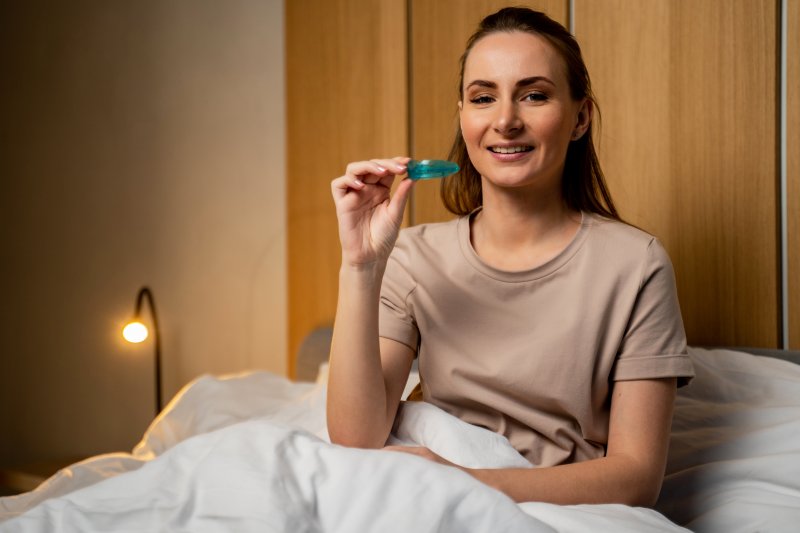
According to the American Medical Association and Johns Hopkins Medicine, sleep apnea affects about 30 million people in the United States, but only 6 million are diagnosed with the condition that could lead to life-threatening consequences.
While many people choose to use a CPAP machine to help them sleep through the night, your sleep dentist can offer alternatives known as oral appliances.
These mouthguard-like devices push the bottom jaw slightly forward, allowing for better airflow while you’re asleep. They can be invaluable for treatment of the disorder. Read on to learn how to take care of your oral appliance so it can better serve your needs.
Brush Your Oral Appliance Gently Each Morning
While you sleep, bacteria grow on your teeth while you’re taking in the night air. These bacteria can lead to foul smell or potentially make you sick if you continue to ingest them while wearing your device.
This is why it’s important to brush your oral appliance every morning when you wake up. Use a soft-bristled toothbrush to gently exfoliate the appliance, making sure to use non-abrasive toothpaste.
Wear the Device on Clean Teeth
You should practice a nightly oral health routine before bed. This step is crucial to maintaining the cleanliness of your appliance and preventing discoloration and odor by limiting the number of bacteria present in your mouth before putting on your oral appliance.
Brushing your teeth and tongue with a fluoride toothpaste, flossing between your teeth, and rinsing with a non-alcoholic mouthwash or warm water before bed will reduce your risk for cavities and other oral infections while you wear your device.
Store Your Oral Appliance Properly
While durable, your oral appliance is not indestructible. Exposure to heat like the inside of a car console can cause the material to warp, excessive trauma from being tossed around in luggage can cause damage, and being left exposed on a nightstand or sink can cause bacteria buildup.
All of these scenarios can be avoided by storing your device in a proper hard carrying case while it’s not in use. Also, be sure that your oral appliance is clean and dry to avoid bacterial growth in storage.
Soak Your Oral Appliance Once a Week
While not strictly necessary, it can be beneficial to soak your device once per week in a warm water/vinegar solution or use a denture tablet for 10 minutes to eliminate odors and loosen and flush any stuck-on plaque or food debris that may be missed by brushing.
It’s a small, simple thing but can add years of life to your oral appliance. Be sure to allow your device and its case to air-dry after soaking.
Have Your Device Checked by Your Dentist Annually
Finally, it’s a great idea to have your oral appliance checked by your dentist at least once per year to ensure it’s in proper working order. This is especially true if you find that your device isn’t performing as intended anymore or has become uncomfortable.
Through these helpful tips, maintaining a cleaning routine for both your teeth and your oral appliance will ensure that your sleep remains uninterrupted and your oral health stays intact. If you’re ever unsure of what to do when cleaning, storing, or maintaining your device, ask your dentist.
About the Author
Dr. Keane Fedosky has served thousands of people with sleep apnea at Sleep Rehab Snoring, Sleep Apnea, & TMJ Treatment. He is a very knowledgeable and compassionate dentist with over twenty years of experience in the field of oral appliance applications. Dr. Fedosky is also a member of the American Academy of Dental Sleep Medicine, a professional organization that supports the continued education and technology of highly skilled sleep dentists. To schedule an appointment, visit the website here or call (972) 753-3737 for more information on oral appliances and other services.
